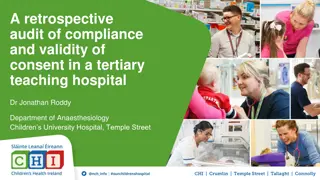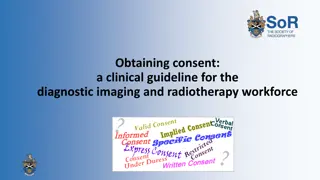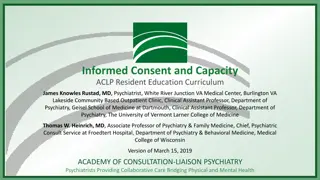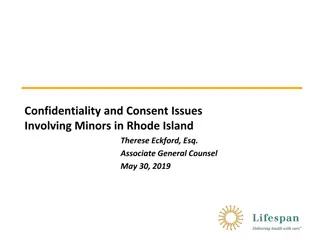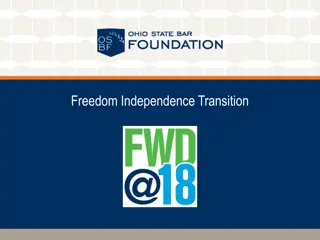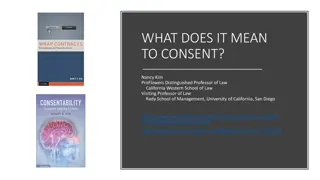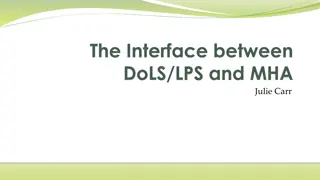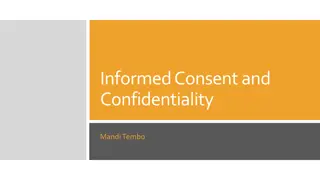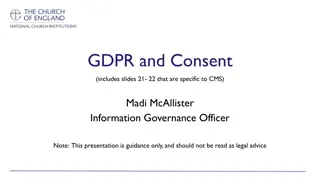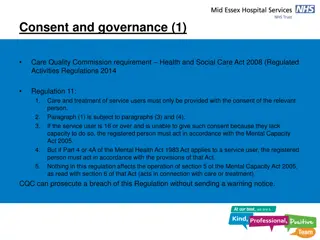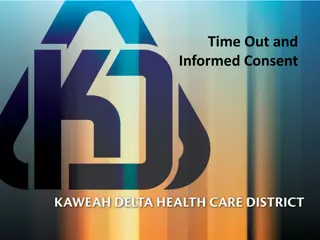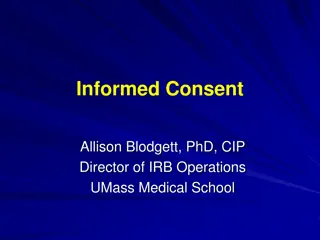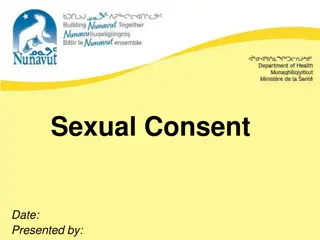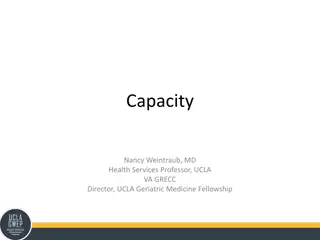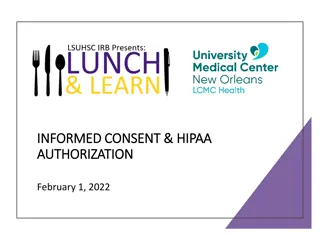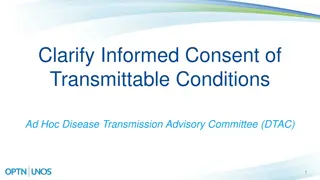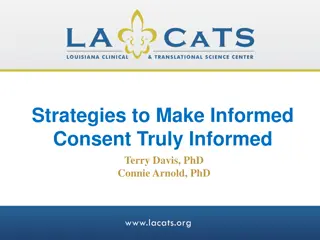Key Updates in HSE National Consent Policy
The HSE National Consent Policy is undergoing key updates to align with the Assisted Decision-Making (Capacity) Act 2015 and its amendments. The revisions include incorporating new legislation, enhancing clarity in information delivery, defining capacity to decide about interventions, and outlining
3 views • 10 slides
RELATIONSHIPS. ALL ABOUT CONSENT
Explore the meaning of consent, strategies for giving or seeking consent, and real-life examples in relationships. The lesson covers defining consent, respecting boundaries, and communication skills. Learn about the legal definition of consent and how to navigate consent using language and body cues
0 views • 29 slides
Kerala High Court Upholds Divorce by Mutual Consent Ruling
Kerala High Court Upholds Divorce by Mutual Consent Ruling\nBackground of the Case\nKerala High Court ruled that the Family Court was justified in granting a divorce by mutual consent, even though the wife later withdrew her consent. The case involved an appeal by the wife challenging the Family Cou
0 views • 4 slides
Understanding Sexual Consent: A Guide for Secondary Students
This presentation focuses on educating secondary students about sexual consent, emphasizing the importance of communication, respect, and boundaries in any sexual activity. It covers the definitions of consent, its importance, what sexual consent entails, and crucial points to remember about obtaini
0 views • 21 slides
Audit of Compliance and Consent at a Tertiary Teaching Hospital
A retrospective audit was conducted at a tertiary teaching hospital to assess compliance and validity of consent procedures. The study aimed to evaluate current practices, determine adherence to guidelines, identify gaps, and implement remedial actions as needed. Data was collected over four weeks,
0 views • 11 slides
Understanding Free Consent and its Components in Indian Contract Law
Free consent in Indian contract law refers to consent that is not influenced by coercion, undue influence, fraud, misrepresentation, or mistake. Coercion involves committing or threatening to commit acts forbidden by the Indian Penal Code to force someone into an agreement. Undue influence occurs wh
1 views • 13 slides
Guidelines for Obtaining Consent in Diagnostic Imaging and Radiotherapy
Seeking patient consent is a fundamental ethical and legal requirement in healthcare. This guideline emphasizes the importance of informed consent in imaging and radiotherapy procedures, highlighting the responsibility of healthcare practitioners to prioritize patient needs, values, and autonomy. Th
0 views • 19 slides
Understanding Ethics in Research: Principles and Major Issues
Ethics in research is crucial for ensuring the well-being of participants and upholding moral principles. Key aspects include beneficence, respect for autonomy, informed consent, and freedom from harm. Major ethical issues involve informed consent, beneficence, respect for anonymity and confidential
5 views • 18 slides
Understanding the Mental Capacity Act and Deprivation of Liberty Safeguards
Explore the key concepts related to the Mental Capacity Act and Deprivation of Liberty Safeguards, including human rights, consent, decision-making, and supporting autonomy. Discover the importance of valid consent and the role of professionals in ensuring individuals have the information and capaci
0 views • 46 slides
Understanding Informed Consent and Capacity in Psychiatry
Exploring the process of obtaining informed consent, defining competence and capacity, assessing decision-making abilities, and examining substitute decision-makers in medical settings. The presentation touches on key points in determining a patient's capacity for treatment decisions, with case scen
0 views • 38 slides
Understanding Consent and Capacity in Wales Safeguarding Procedures
In Wales safeguarding procedures, obtaining consent from adults at risk is crucial for engaging them in the safeguarding process effectively. Consent should be voluntary, informed, and given without influence. It is important to assess mental capacity for valid consent. The decision to report should
1 views • 20 slides
Consent and Confidentiality Issues Regarding Minors in Rhode Island Legal Landscape
The legal landscape in Rhode Island pertaining to minors' rights involves a delicate balance between traditional views and the need for minors to make their own decisions in certain situations. Rhode Island's age of consent is 18, with special provisions for minors aged 16 and 17. The impact of revi
0 views • 8 slides
Ethical Considerations in Reporting Violence Against Women: Interviewing Victims and Ensuring Consent
It is crucial for journalists reporting on violence against women to interview victims and survivors ethically and respectfully, ensuring informed consent is obtained before sharing their stories. This involves being sensitive to trauma, prioritizing the well-being of the interviewees, and assessing
3 views • 11 slides
Understanding Consent and Sexual Conduct Law
Exploring topics related to consent, sexual conduct law, and penalties. Covers aspects like age restrictions, marital laws, sexual assault, date rape, sexual battery, and the importance of clear consent. Emphasizes that lack of protest doesn't imply consent and provides insights on what constitutes
5 views • 27 slides
Understanding Consent: Legal and Moral Implications
Consent, as explored by Nancy S. Kim, involves a complex interplay of legal and moral consequences. This concept is context-dependent, relational, and incremental, with varying levels of autonomy interests at stake. Kim's work delves into the conditions, limits, and assessment of consent, shedding l
0 views • 38 slides
Understanding Mental Health Legislation and Capacity Assessments
This content provides information on various aspects of mental health legislation, including the Mental Health Act 1983, the Mental Capacity (Amendment) Act 2019, and the implications for individuals objecting or consenting to treatment. It explores scenarios where different legal provisions apply,
0 views • 13 slides
Research with Adults with Diminished Capacity to Provide Consent - Regulatory Guidelines and Best Practices
This research covers the regulatory requirements, background, and best practices for conducting studies involving adults with diminished capacity to provide consent. It discusses IRB membership, approval criteria, consent requirements, and the importance of safeguarding vulnerable populations. The c
3 views • 29 slides
Understanding the Informed Consent Process in iRIS
Learn how to efficiently navigate the Informed Consent Builder feature in iRIS for creating consent forms. The process involves selecting a consent template, merging it with application data, editing the document, and submitting it for review within the system.
0 views • 14 slides
Understanding Informed Consent and Confidentiality in Research
Informed consent is vital in research to ensure participants understand the commitments, benefits, and consequences. Confidentiality safeguards sensitive information. This content covers the key aspects of informed consent, who can provide consent, and the importance of protecting participant identi
0 views • 10 slides
Understanding Medicolegal Aspects of Consent in Medical Practice
Consent in medical practice is crucial, serving as a defense against liability. The Nuremberg Code emphasizes voluntary informed consent. Patients have rights to autonomy, and doctors must respect these by obtaining valid consent before treatment. The doctor-patient relationship has evolved due to t
0 views • 42 slides
F.R.I.E.S.: A Guide to Enthusiastic Consent at APRIL Conference 2022
Disability advocates Mels Felton and Whitney Doyle discuss enthusiastic consent, highlighting the importance of inclusive sex education for individuals with disabilities. Consent is defined as permission for sexual activities through effective communication, aiming to empower individuals and promote
0 views • 14 slides
Understanding Guardianship: Exploring Capacity, Consent, and Decision-Making Options
Exploring the complexities of guardianship, this content delves into the spectrum of decision-making support, including alternatives like supported decision-making and power of attorney. It discusses when guardianship is necessary based on capacity, consent, and autonomy, presenting a comprehensive
0 views • 15 slides
Understanding GDPR Consent and Validity for Data Processing
This presentation provides insights into GDPR consent requirements, focusing on the concepts, components, and validity of consent for processing personal data. It covers essential aspects such as the definition of consent, explicit consent, components of valid consent, imbalance of power considerati
0 views • 22 slides
Changes in Capacity Allocation Regulations for Gas Infrastructures in Portugal
The new regulation in Portugal brings significant changes in capacity booking and trading to promote convergence with CAM NC and enable a secondary market. Major changes include ex-ante payment of capacity rights, capacity allocation via a booking platform, and enhancement of liquidity in the second
0 views • 13 slides
Guidelines for Obtaining Consent in Influenza Vaccination
This informative content discusses the importance of obtaining consent before administering immunizations, focusing on the flu season of 2018/19. It emphasizes the principles of informed consent, the specific information to be provided, and the considerations for obtaining consent from adults. Addit
0 views • 9 slides
Understanding Consent and Governance in Health and Social Care
The Health and Social Care Act 2008 outlines the importance of obtaining consent for the care and treatment of service users, incorporating regulations from the Mental Capacity Act 2005 and Mental Health Act 1983 where necessary. The Francis report emphasizes the need for informed consent or lawful
0 views • 33 slides
Importance of Time Out and Informed Consent in Patient Care
Time Out and Informed Consent are crucial components of quality care and patient safety, aimed at preventing wrong-sided or wrong procedures. Time Out involves stopping all activities, positively identifying the patient, and confirming procedure details before proceeding. Informed Consent is a discu
0 views • 5 slides
Remote Informed Consent Process for Research Studies
This presentation covers the remote informed consent process for research studies, including defining remote consent, options for electronic informed consent, processes for minimal and greater than minimal risk studies, and guidelines for obtaining consent via electronic or wet signatures. It also d
0 views • 20 slides
Understanding Informed Consent in Research
Explore the significance of informed consent in research through examples like the Tuskegee Study, guidance for investigators, and details on who can provide consent. Learn about different types of consent documentation and subject populations that require special approval.
0 views • 20 slides
Understanding Sexual Consent Workshop Presentation
Join our interactive workshop on sexual consent to learn about what consent entails, how to recognize it, and understand different scenarios. Explore the importance of asking for consent and engage in activities to enhance your knowledge and skills in this crucial area. Discover resources for more i
0 views • 16 slides
Understanding Capacity and Consent in Medical Decision-Making
Exploring the concepts of capacity and competence in medical decision-making, this content delves into the legal implications and distinctions between the two terms. It discusses the importance of a physician's role in assessing capacity, as well as the ability to consent based on communication and
0 views • 22 slides
Understanding Capacity to Consent to Sexual Activity
Capacity to consent to sexual activity involves the ability to understand, assess risks, make choices, and communicate decisions. It is not about acting in one's best interest or conforming to others' expectations. Volition in intimate relationships emphasizes clear, voluntary participation, while s
0 views • 15 slides
Understanding Informed Consent and HIPAA Authorization Process
Explore the key aspects of the Belmont Report, elements of Informed Consent, tips for drafting it, and the significance of HIPAA authorizations. Review UMCNO policy on the consent process, understand the core and other elements of informed consent, and learn about the selection of participants based
0 views • 21 slides
Understanding Consent Agenda in Meetings
Learn about consent agreements and how they streamline meeting processes by grouping routine items for quick approval. Discover the difference between normal agendas and consent agendas, along with examples of what can be included. Explore the consent agenda process and understand its implementation
0 views • 12 slides
Understanding Informed Consent in Clinical Trials
Informed consent in clinical research is a foundational principle of research ethics, involving the communication process, respect for participant rights, and ethical principles such as autonomy, beneficence, justice, and solidarity. Participants have core rights that need to be upheld, including se
0 views • 54 slides
Understanding Consent in Pediatric Care
Explore the nuances of consent in pediatric care, including when it is needed, who can give it, and what happens if a parent refuses. Delve into topics such as the capacity to consent and determining best interests, and understand the role of children in the decision-making process.
0 views • 15 slides
NSW Consent Reforms: Legislative Changes and Impacts on Sexual Assault Laws
In the past 40+ years, the NSW legislative landscape has seen significant changes in addressing sexual assault, culminating in the recent Crimes Legislation Amendment (Sexual Consent Reforms) Act 2021. These reforms implement recommendations, introduce affirmative consent model, and enhance provisio
0 views • 32 slides
Ethical Challenges in Biomedical Research Consent and Data Control
Advanced bioinformatics research, reliant on large datasets and biobanks, raises concerns about personal data protection and individual consent. Ensuring participant control over data usage, the need for new consent models, and ongoing engagement pose ethical dilemmas in medical research ethics. Ach
0 views • 19 slides
Enhancing Informed Consent for Transmittable Conditions in Transplant Procedures
Proposing solutions to improve the informed consent process for transplant recipients in cases where donors have known transmittable medical conditions. The current policy is vague and burdensome, requiring individual consent for each positive test result, leading to monitoring and enforcement chall
0 views • 19 slides
Strategies for Effective Informed Consent Process
Explore strategies to improve informed consent by addressing issues with consent forms, literacy levels, and readability. Learn how to set clear goals, assess consent forms, and enhance readability for better patient understanding.
0 views • 47 slides




